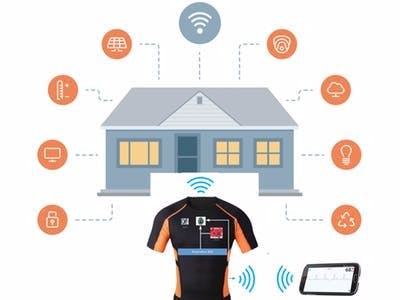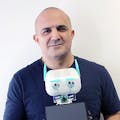Recently, design of wearable devices has increased due to the technological revolution of the internet of things (IoT). One of the requirements of IoT that the devices should be small and low-power. Processors and their evolution of the last years, have become a key piece for IoT devices. Intel Edison and Intel Curie are the most recognized technologies in the market and provide all requirements that suit to IoT.
My application is based on this kind of devices to connect the human body to the cloud. The technological market is invaded of a great variety of wearable devices like smart watch or glasses that do not use their full potential in IoT. These devices can only acquire a litter bit part of our Bio-Information. It could be used to monitor our vital sign and create other application to introduce the human into the IoT. For example, The Bio-Smart Wear can be used to monitor patients in their own home or nursing. The future expectations are that all people are connected to the cloud, monitoring their vital signs so that diseases can be detected through clothing.
My Bio-SmartWear allows to acquire ECG signal, breathing frequency, body temperature and heart rate. My project is based on an Arduino-101 technology taking advantage of the Ble-Bluetooth and its small size.
Arduino 101 would capture the data using different sensors, as show in the next figure.
The T-shirt has three sensors: three ECG electrodes, one photo-plethysmography sensor and one temperature sensor. The ECG electrodes need to have a specific configuration such as that described by einthoven triangle.
Using this configuration and an operational amplifier as AD8232 (Figure), it could be possible acquire the ECG signal.
The photoplethysmography sensor uses the absorption of light to calculate the beat heart rate.
Nevertheless, it is possible change this sensor by a AXREFDES117 to calculate the SPO2. As temperature sensor I use a LM35 ensor which is placed under the armpit. The Arduino 101 is used to acquire the information and is embedded into the T-shirt showed in the next figure:
However it is necessary to incorporate a second hardware in order to introduce an intelligent application. This second hardware is an Intel Edison which is a Bluetooth server and act as a bridge between the smart wear and some artificial intelligent entities. Once data has been captured through Arduino 101 and sent to the Bluetooth server (intel Edisons), it is received by an intelligent entity or agent.
This agent is the representation of the human into the intelligent virtual environment or IVE. Inside the IVE co-exist many agents representing humans and interacting with others agents. The agent acting as virtual representation of the human will have a direct connection with the smart wear. This connection allows to the agent know the human vital sign and be at the same time a container of machine learning algorithm that helps to predict some issues.
To create this IVE I use tools developed for my master degree project and is called JaCalIVE (). JaCalIVE is a tool that allows to create complex simulations working with multi agent systems. In JaCalIVe we can define the entities that live into an IVE in three blocks : situated, not situated and physical, as is showed in the next figure.
In this project I use the physical entities such as the human immersed agent. This agent is a representation of the human into the IVE, i.e. the agent is connected to the human. In this case the connection is through the Arduino 101. The agent capture the information sending by the Arduino 101 and it knows the state of the human. The next figure show how the Arduino 101 send the information to the human immersed agent.
The next step is to stablish communication between other entities.One a possible entity is a hospital. This hospital can be represented as an agent and if the human immersed agent detects an anomaly in the vital sign, it sends a message to the hospital agent in order to help to the patient. Nevertheless, this part does not take in to account in this project as well as the detection of abnormalities in vital signs is an important topic that I am currently working on.
- J.A. Rincon, Emilia Garcia, V. Julian and C. Carrascosa
- Developing Adaptive Agents Situated in Intelligent Virtual Environments
- International Conference on Hybrid Artificial Intelligence Systems pp. 98-109. (2014)
- J.A. Rincon, C. Carrascosa and Emilia Garcia
- Developing Intelligent Virtual Environments using MAM5 Meta-Model
- International Conference on Practical Applications of Agents and Multi-Agent Systems pp. 379-382. (2014)
- J.A. Rincon, Emilia Garcia, V. Julian and C. Carrascosa
- From Virtual to Real, Human Interaction as a Validation Process for IVEs
- 9th International Symposium on Intelligent Distributed Computing - IDC'2015 pp. 49-59. (2015)
- J.A. Rincon, J. L. Poza, V. Julian, J. L. Posadas and C. Carrascosa
- Extending MAM5 Meta-Model and JaCalIV E Framework to Integrate Smart Devices from Real Environments Plos ONE N. 10.1371/jo pp. 1-27. (2016)




_baVEVgguW1.jpg?auto=compress%2Cformat&w=48&h=48&fit=fill&bg=ffffff)








_3u05Tpwasz.png?auto=compress%2Cformat&w=40&h=40&fit=fillmax&bg=fff&dpr=2)

Comments
Please log in or sign up to comment.